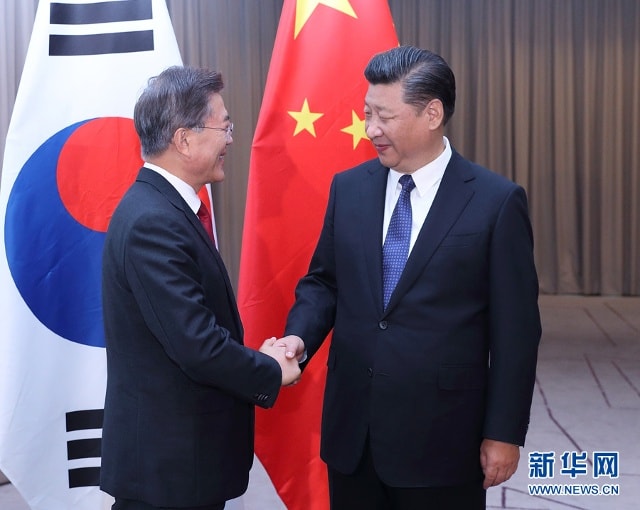China will continue to retaliate against South Korea over THAAD
(Baonghean.vn)- Analysts say China is likely to continue economic retaliation against South Korea after the leaders of the two countries failed to narrow their differences over the US deployment of the Terminal High Altitude Area Defense (THAAD) missile defense system in South Korea during their first face-to-face meeting on the sidelines of the G20 Summit in Germany last week.
Analysts also expressed skepticism that South Korean President Moon Jae-in and Chinese President Xi Jinping would reach a consensus on THAAD at a meeting likely to take place next August, to mark the 25th anniversary of the establishment of bilateral diplomatic relations.
“It won’t be easy. It will take time,” said Park Won-gon, a professor of international relations at Handong Global University. “China will continue to retaliate, and the measures could become more severe.”
 |
| South Korean President Moon Jae-in and Chinese President Xi Jinping. Photo: AP |
Professor Kim Hyun-wook from the Korea National Diplomatic Academy also agreed with the above view and emphasized: "It will be impossible to resolve the disagreement between the two sides in a short period of time."
Professor Kim said that President Xi’s reputation would be “damaged” if he suddenly decided to suspend sanctions against Seoul, as he had strongly opposed THAAD in front of President Moon, as well as US President Donald Trump and Russian President Vladimir Putin during the G20 Summit. “With the upcoming Chinese Communist Party Congress, the Chinese president may not want to do anything that could risk his political career,” Kim said.
Sources close to South Korean businesses predict that these businesses will withdraw from China if the two countries' leaders continue to maintain the stalemate in the next meetings, possibly on August 24.
Meanwhile, Professor Park proposed establishing an expert-level consultative body to discuss possible conditions to resolve the disagreement over THAAD.
The professor pointed out: “For example, Seoul and Beijing, in the process of negotiating with Washington, could formally agree to withdraw THAAD from South Korea if Pyongyang’s ballistic missile threats are limited. And the consultative body could discuss how to determine how the threats from the Kim Jong-un regime are reduced.” According to him, the US should intervene in resolving this disagreement between China and South Korea./.
Lan Ha
(According to Korea Times)
| RELATED NEWS |
|---|
